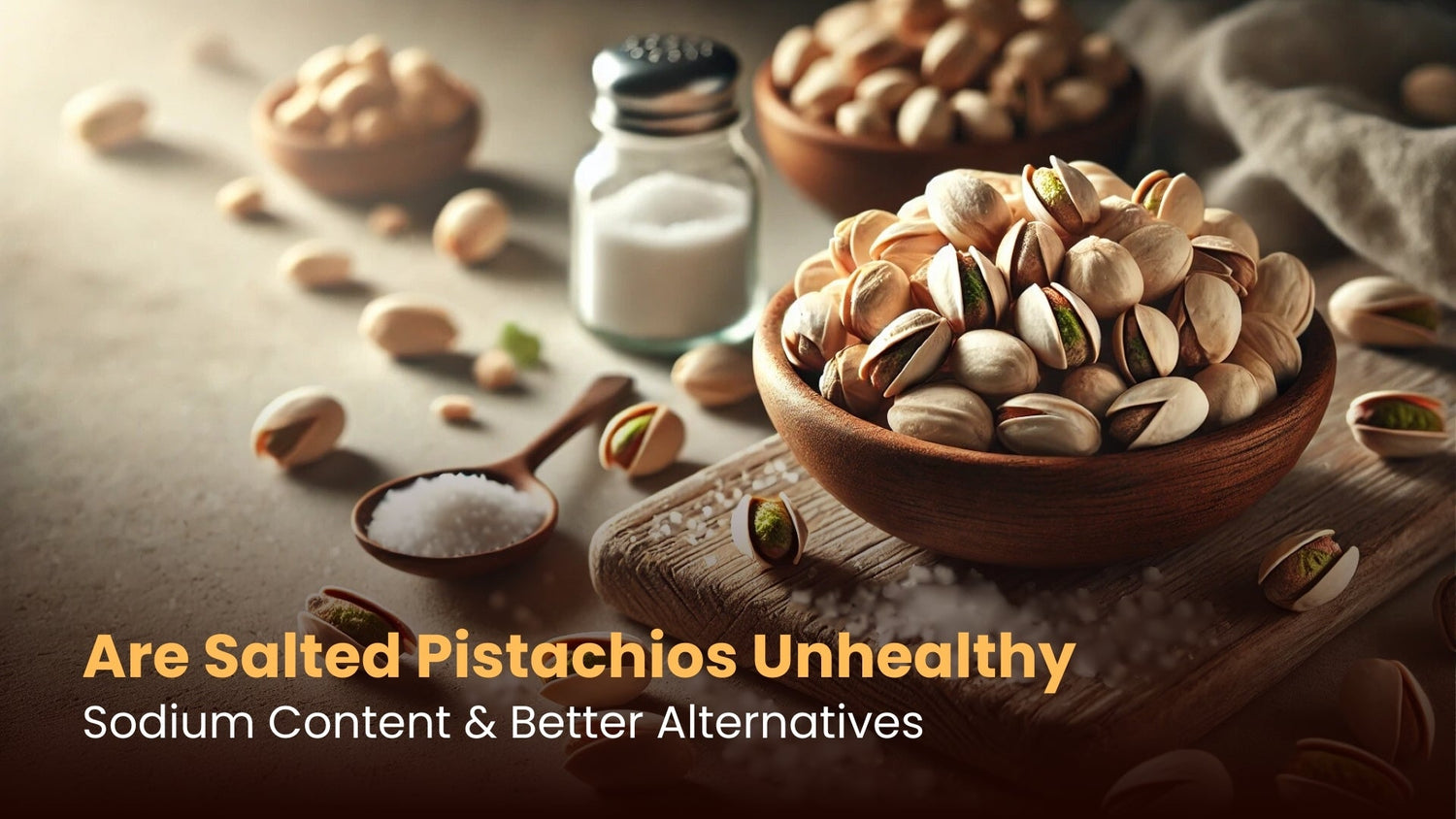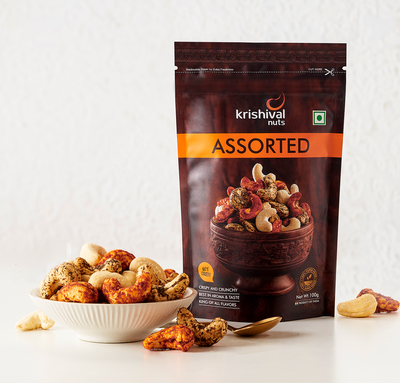
Pistachios are often considered a healthy snack, packed with protein, fiber, and beneficial fats. However, when they come salted, concerns arise about their sodium content and potential health impacts. Many people enjoy the savory taste of salted pistachios, but are they doing more harm than good?
Table of Contents
-
Introduction
Shop Related Products
-
Nutritional Profile of Pistachios
-
Health Benefits of Pistachios
-
Sodium Content in Salted Pistachios
-
Risks Associated with High Sodium Intake
-
Comparisons: Salted vs. Unsalted Pistachios
-
Healthier Alternatives to Salted Pistachios
-
Conclusion
-
FAQs
Nutritional Profile of Pistachios
Pistachios are a nutrient-dense snack, offering a good balance of macronutrients and essential vitamins. Their raw form is widely recognized for being heart-healthy, but adding salt alters their nutritional value. Below is a breakdown of the nutrients found in raw pistachios per 28-gram (1-ounce) serving:
|
Nutrient |
Amount per 28g (1 oz) |
% Daily Value (DV) |
|
Calories |
159 kcal |
8% |
|
Protein |
6 g |
12% |
|
Total Fat |
13 g |
20% |
|
Saturated Fat |
1.5 g |
8% |
|
Carbohydrates |
8 g |
3% |
|
Fibre |
3 g |
12% |
|
Sugar |
2 g |
- |
|
Sodium (unsalted) |
0 mg |
0% |
|
Sodium (salted) |
120-250 mg |
5-11% |
|
Potassium |
290 mg |
6% |
While pistachios naturally contain zero sodium, salted versions can have varying levels, depending on how much salt is added during processing. Even moderate consumption of salted pistachios can contribute significantly to daily sodium intake, particularly for individuals who consume processed foods regularly.
Health Benefits of Pistachios
Pistachios are more than just a crunchy snack—they offer a range of health benefits that make them a great addition to a balanced diet. Unlike processed snack options, pistachios provide essential nutrients that support overall well-being.
-
Rich in Nutrients
Pistachios are packed with protein, healthy fats, fiber, and essential vitamins. A one-ounce (28g) serving contains about 6 grams of protein, making them an excellent plant-based protein source. They also provide vitamins B6 and E, along with important minerals like potassium, magnesium, and phosphorus. -
Heart Health Benefits
The healthy fats in pistachios, primarily monounsaturated and polyunsaturated fats, help maintain good cholesterol levels. Studies suggest that incorporating pistachios into a heart-healthy diet may reduce LDL (bad cholesterol) and increase HDL (good cholesterol), potentially lowering the risk of heart disease. -
Supports Weight Management
Despite their calorie density, pistachios can aid in weight control. Their fiber and protein content contribute to satiety, preventing overeating. Additionally, the act of shelling pistachios slows down consumption, promoting mindful eating. -
Good for Eye Health
Pistachios contain lutein and zeaxanthin, two antioxidants that support eye health by protecting against age-related macular degeneration (AMD). These compounds help filter harmful blue light and reduce oxidative damage to the retina. -
Blood Sugar Regulation
With a low glycemic index, pistachios may help regulate blood sugar levels. Their combination of protein, fiber, and healthy fats slows digestion and prevents rapid spikes in blood sugar, making them a great snack option for people managing diabetes. -
Gut Health Improvement
The fiber in pistachios supports digestive health by promoting beneficial gut bacteria. Prebiotic properties in pistachios encourage the growth of probiotics, which play a role in digestion and immune function.
Sodium Content in Salted Pistachios
While pistachios offer several health benefits, the sodium content in salted varieties can be a concern, especially for individuals monitoring their salt intake.
-
How Much Sodium Do Salted Pistachios Contain?
The sodium content in salted pistachios varies depending on the brand and processing method. On average, a one-ounce (28g) serving of salted pistachios contains around 120–250 mg of sodium. Some heavily salted versions may contain even more, pushing sodium levels higher than recommended for individuals with hypertension or kidney concerns. -
Comparing Salted vs. Unsalted Pistachios
Unsalted pistachios contain virtually no sodium (0–2 mg per serving), making them a healthier option for those watching their sodium intake. Choosing unsalted or lightly salted pistachios can help balance taste preferences while reducing excessive sodium consumption. -
Health Risks of High Sodium Intake
-
Increased Blood Pressure: Consistently high sodium intake is linked to hypertension, which can elevate the risk of heart disease and stroke.
-
Water Retention: Consuming too much sodium can cause bloating and fluid retention, leading to temporary weight gain and discomfort.
-
Kidney Strain: Excess sodium forces the kidneys to work harder, potentially contributing to kidney disease over time.
-
Who Should Limit Salted Pistachios?
-
Individuals with high blood pressure, kidney disease, or heart conditions should limit their intake of salted pistachios to avoid excess sodium.
-
Those following a low-sodium diet should opt for unsalted varieties to maintain optimal health.
Risks Associated with High Sodium Intake
Consuming too much sodium can lead to various health concerns, affecting both short-term and long-term well-being. While sodium is essential for fluid balance and nerve function, excessive intake poses several risks:
-
Increased Blood Pressure – High sodium levels cause the body to retain more water, leading to higher blood volume and increased strain on blood vessels. Over time, this can contribute to hypertension, a major risk factor for heart disease and stroke.
-
Kidney Strain – The kidneys regulate sodium balance, but excess intake forces them to work harder. This can contribute to kidney disease or exacerbate existing conditions, potentially leading to kidney failure.
-
Bone Health Decline – A high-sodium diet can increase calcium loss through urine, which may weaken bones and raise the risk of osteoporosis over time.
-
Water Retention and Bloating – Sodium causes water retention, leading to bloating, puffiness, and discomfort. This effect is particularly noticeable after consuming salty foods like salted pistachios.
-
Higher Risk of Stomach Cancer – Some studies suggest a link between excessive sodium intake and an increased risk of gastric cancer. High sodium levels may contribute to stomach lining irritation and Helicobacter pylori infections, which are associated with this type of cancer.
Comparisons: Salted vs. Unsalted Pistachios
When deciding between salted and unsalted pistachios, it's essential to compare their nutritional profiles to understand their impact on health.
|
Nutrient (per 1 oz / 28g) |
Salted Pistachios |
Unsalted Pistachios |
|
Calories |
~160 kcal |
~160 kcal |
|
Total Fat |
13g |
13g |
|
Sodium |
120-250mg (varies by brand) |
0-2mg |
|
Protein |
6g |
6g |
|
Fibre |
3g |
3g |
|
Potassium |
~290mg |
~290mg |
Key Differences:
-
Sodium Levels: The most significant difference is the sodium content. Salted pistachios can contain up to 250mg of sodium per ounce, whereas unsalted varieties have negligible amounts.
-
Taste & Cravings: Salt enhances flavor but may lead to increased cravings and higher consumption, potentially resulting in excessive sodium intake.
-
Health Considerations: For individuals monitoring their sodium intake due to high blood pressure, heart disease, or kidney conditions, unsalted pistachios are the better option.
Healthier Alternatives to Salted Pistachios
If you enjoy pistachios but want to reduce your sodium intake, there are plenty of healthier options available. Here are some great alternatives:
-
Unsalted Pistachios – The simplest switch is opting for raw or dry-roasted unsalted pistachios. They provide the same crunch and nutrients without the added salt.
-
Lightly Salted Pistachios – If you prefer some salt, look for lightly salted versions. These typically contain much less sodium than traditional salted pistachios.
-
Raw Almonds – A great source of healthy fats, protein, and fiber, raw almonds can be a satisfying alternative with a naturally mild taste.
-
Walnuts – These are rich in omega-3 fatty acids and have a softer texture compared to pistachios, making them a great heart-healthy choice.
-
Pumpkin Seeds – Also known as pepitas, these seeds offer a crunchy texture with plenty of magnesium, iron, and protein. Choose unsalted varieties to keep sodium low.
-
Sunflower Seeds (Unsalted) – A budget-friendly alternative packed with vitamin E, these seeds provide a similar snacking experience without excessive sodium.
-
Cashews (Unsalted or Lightly Salted) – Cashews are naturally creamy and slightly sweet, making them a delicious alternative to salted pistachios.
-
Roasted Chickpeas – These are crunchy, high in protein, and available in various flavors, offering a great alternative to nuts for those with allergies.
-
Homemade Nut Mix – Combine raw nuts and seeds like pistachios, almonds, cashews, and pumpkin seeds for a nutrient-dense snack with full control over the salt content.
-
Air-Popped Popcorn (Lightly Seasoned) – If you crave a salty crunch, try homemade air-popped popcorn with a sprinkle of nutritional yeast or light sea salt for a healthier, fiber-rich option.
By choosing these alternatives, you can enjoy nutrient-dense snacks while keeping your sodium intake in check.
Conclusion
While salted pistachios can be enjoyed in moderation, their high sodium content may pose health concerns for those watching their salt intake. Choosing unsalted pistachios or healthier alternatives like raw nuts and seeds allows you to enjoy the benefits of these nutrient-rich snacks without excessive sodium. Krishival offers naturally grown pistachios and a variety of wholesome, unprocessed nuts, ensuring you get high-quality, nutritious options that align with a healthy lifestyle.
FAQs
Q1. Are salted pistachios unhealthy?
Salted pistachios aren’t inherently unhealthy, but their high sodium content can contribute to high blood pressure and water retention if consumed excessively. Opting for unsalted varieties is a better choice for long-term health.
2. How much sodium is in salted pistachios?
The sodium content varies by brand, but on average, one ounce (28g) of salted pistachios contains around 120–250 mg of sodium. Always check the nutrition label for exact amounts.
3. Can I eat salted pistachios every day?
Yes, but in moderation. If you consume a balanced diet with low sodium intake from other sources, a small portion of salted pistachios can fit into your daily routine. However, those with hypertension or heart conditions should opt for unsalted versions.
4. What happens if I eat too many salted pistachios?
Excessive consumption can lead to bloating, increased blood pressure, and dehydration due to high sodium intake. Overeating any nuts can also contribute to weight gain due to their calorie density.
5. Are there any benefits to eating salted pistachios?
Despite the added salt, pistachios remain a great source of protein, healthy fats, fiber, and antioxidants. However, choosing unsalted or lightly salted versions maximizes health benefits.
6. How do I remove salt from salted pistachios?
You can rinse salted pistachios under warm water and let them dry to reduce the sodium content. However, this may slightly alter their texture and flavor.
7. Are lightly salted pistachios a better option?
Yes, lightly salted pistachios contain significantly less sodium than regular salted ones while still offering some saltiness. They are a good middle-ground option for those who prefer some salt but want to cut back.
8. What are the healthiest nuts to eat?
Almonds, walnuts, and pistachios are among the healthiest nuts, offering heart-healthy fats, protein, and antioxidants. Choosing raw or dry-roasted unsalted varieties is ideal for health benefits.
9. Do salted pistachios cause weight gain?
Pistachios are calorie-dense, so excessive consumption can lead to weight gain. However, they also promote satiety, which may help control overall calorie intake when eaten in moderation.
10. Where can I buy unsalted, high-quality pistachios?
Krishival offers naturally grown, unsalted pistachios and other premium nuts, ensuring you get a nutrient-rich and chemical-free snacking option.











